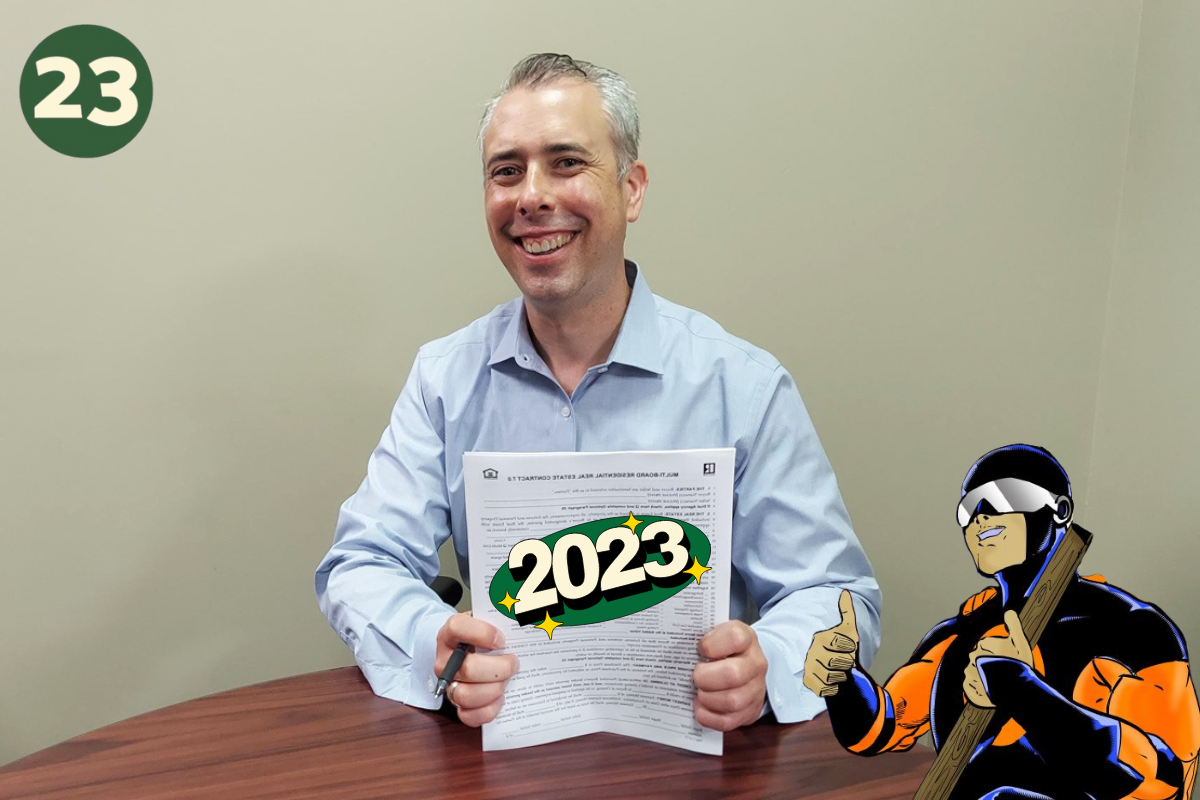One of the largest financial transactions most people will ever undertake is buying or selling a home. Your real estate contract specifically lays out what each party has to do – price, payment terms, inspection deadlines, repair negotiations, closing dates, and more. That leaves little room for errors, so small slips can end up costing you thousands of dollars or a forfeited deposit. A careful Real Estate Contract Review catches hidden landmines before you sign on the dotted line.
Imagine it this way: at the time your transaction closes, title (ownership) of the property is legally transferred. Indeed, one synopsis reports that at closing the seller executes the deed (usually through an attorney or agent) to transfer title to the buyer. And any earnest money you paid is usually in escrow by a neutral third party (usually a title company or attorney) until closing. These realities suggest why attorneys are even used in ordinary closings. Cutting corners on thorough review means you could overlook a key clause or deadline that puts you at risk.
If you’ve been searching Google for “Do you need a lawyer to buy a house” or “Do you need an attorney to sell a house,” don’t worry, you’re not alone. The quick answer is that in most places (Illinois included) the law does not compel you to have a lawyer. But don’t forget: not mandatory ≠ not important. In this blog we’ll break down the risks of going it alone, how a lawyer can assist, and even Illinois-specific regulations (Illinois frequently has its own procedures such as brief attorney-review contingencies). By the end, you’ll know how to decide what’s right for your deal – and when to call on 23 Legal for help!
Do You Need an Attorney to Review Your Real Estate Contract?
Legally speaking, most states (including Illinois) do not mandate that buyers or sellers have an attorney sign off on a contract. Many real estate closings proceed with just agents, title companies, and lenders. All that being said, the fact that attorneys are included in contract forms and closings is a huge clue: a lawyer’s eye is worth it. Even if you’re sure, ask yourself: do I really get every word of this contract? A seasoned Illinois real estate lawyer can clarify confusing language in simple English, identify any one-sided language, and recommend edits or contingencies that look out for your interests.
For buyers, the question “Do you need a lawyer to buy a house?” generally tilts toward “it’s smart to at least have one look over your contract.” Buyers are looking for assurances: a clean title, reasonable financing terms, and contingencies (such as inspections or appraisal) that allow you to walk away if something does go wrong. A lawyer can make sure those are drafted properly.
For those sellers who wonder “Do you need an attorney to sell a house?”, the response is the same. Sellers should ensure the agreement documents who pays which costs, what happens if the buyer defaults, and that you have made all necessary disclosures (Illinois law mandates certain property disclosures, for instance). A lawyer will identify any omitted wording and ensure your responsibilities and rights are in equilibrium.
In brief, you can legally sign without an attorney, but there are a lot of pitfalls in a typical contract. That deposit you paid? It’s being held in escrow by a title company or attorney, so money is at stake. Wouldn’t you want someone to look out for that? Having an attorney for Real Estate Contract Review is all about peace of mind – you’re not only paying legal fees, you’re potentially saving a lot more by avoiding mistakes.
Risks of Signing a Real Estate Contract Without Legal Review
Skipping the lawyer’s review can lead to serious headaches. Real estate contracts are packed with legal jargon and deadlines. Here are some common risks:
- Ambiguous Terms or Unfavorable Clauses: Without a lawyer, you may miss subtleties in the wording. For instance, a minor variation in the financing clause or inspection contingency might mean you lose your deposit if financing cancels out or a major repair is required. In some cases, sellers include “as-is” language or arbitration provisions that restrict your rights – a lawyer would catch and clarify these.
- Missing Contingencies: Individuals frequently forget to add necessary protections, or they throw them in with inadequate conditions. A buyer may say “I want an inspection contingency,” but if it’s not well-drafted (with deadlines and cures), you may still be liable if there’s trouble according to inspectors. Likewise, sellers may fail to require a buyer financing contingency to safeguard their deal.
- Title and Ownership Surprises: Title problems occur more frequently than you might imagine. A forgotten lien by a neighbor, an old easement, or a family disagreement over ownership can stop a sale in its tracks. Title insurance can insure large issues, but an attorney can identify small title warning signs early (e.g., a missing previous deed or misnamed owner).
- Legal Compliance and Disclosures: Illinois also has regulations regarding seller disclosures (lead paint, mortgages, home restrictions, etc.). If your agreement does not specifically address these, you may be penalized later. For sellers: selling without mandated disclosures can even lead to lawsuits. Buyers: you want to make sure any known problems (such as zoning infractions or code issues) are taken care of or that the right to cancel exists.
- Money and Timing: Real estate transactions involve high stakes and close timelines. One day’s delay after the closing date can result in daily charges. A lawyer assists in making the contract’s deadlines and extensions reasonable (for financing, appraisals, survey problems, etc.). If an unexpected issue arises, your lawyer may be able to stall you (or guide you through canceling if necessary) based on the terms of the contract.
- Financial Loss: Worst-case, errors can lose you the deal or thousands in attorney fees down the road. For instance, one misplaced comma in the legal description of the property could mean the incorrect parcel is being sold. An attorney review might pick up on that before it costs time and money to correct at the title company.
As one realtor-advice website explains it, closing day can be “riddled with last-minute issues” – some small, others serious – which can even “wreck a deal” if you’re not ready. Without an attorney to double-check, you could approach closing in a state of happy ignorance about a pending problem.
Benefits of Having an Attorney Involved Early

Having a lawyer join the team early puts many of those risks into advantages. Here’s what you gain by having an attorney as part of your Real Estate Contract Review:
- Clarity and Education: A lawyer will clarify what each part of the contract means to you. These contracts can look like thick blocks of legalese. We’ll walk it through so you understand precisely what you’re signing. (“Does this arbitration clause kick in if a pipe explodes? What happens if I don’t sell my existing house on time?”) Having someone to answer those “uh-oh” questions is worth its weight in gold.
- Problem Prevention: Lawyers are constantly seeing things others don’t. We raise missing contingencies, recommend extra protections, and identify concealed costs or responsibilities (such as who pays HOA transfer charges or certain prorations). That frequently involves renegotiating a contract beforehand, or adding addenda prior to any party being bound. Avoiding a problem beforehand is generally less expensive and less stressful than fixing it later.
- Negotiation Help: When an unfair element emerges in a contract, it may be possible for a lawyer to suggest appropriate amendments. A lawyer can solve unfair contract provisions by either modifying existing clauses or adding new amendments. The negotiation process will proceed through your agent or attorney to achieve fairer terms.
- Smooth Closing: Title companies along with agents and lenders work with us to maintain project progress. We will identify missing paperwork or financing documents at an early stage. The early identification of missing documents through our coordination results in faster closing procedures by avoiding urgent late requests. Illinois law permits attorneys to participate in the closing meetings that take place in the state.
- Legal Compliance: We make sure the contract and closing are in accordance with Illinois law and local custom. For instance, we review any necessary state disclosures or adherence to local “Uniform Conveyancing Act” regulations. This minimizes the chance that a technical problem might render part of your agreement invalid.
- Peace of Mind: Having an expert in your corner allows you to breathe a little easier in what can otherwise be a stressful experience. You’re spending hundreds of thousands of dollars – isn’t it worth ensuring everything is on solid ground? Having an attorney means you have someone at the table whose sole responsibility is to look out for your interests.
In short, it’s cheaper in the long run to pay for legal assistance upfront. It’s like insurance: the low initial cost of a Real Estate Contract Review can keep you from having to pay thousands or tens of thousands later due to mistakes.
Common Issues a Real Estate Lawyer Can Spot in Contracts

Here are specific red flags attorneys often catch in contracts (some are easy to overlook if you’re not a lawyer):
- Title and Ownership Errors: Incorrect or omitted legal property descriptions, party names, or vesting (the way owners take title). Even a misplaced or typographical error in the lot number can slow down closing.
- Liens and Encumbrances: Prior mortgages, tax liens, mechanics’ liens, judgments, or easements that haven’t been cleared or disclosed properly. (Such as a concealed sewer easement that could limit your use of the backyard.)
- Contingency Wording: Unclear or incomplete contingencies. An attorney will make your financing contingency very specific about what occurs if your loan doesn’t go through, or your inspection contingency includes the repairs you require.
- Earnest Money Terms: How your deposit is being held, and under what circumstances it can be refunded. (Your lawyer will ensure that if the buyer defaults without good reason, the seller gets to keep the deposit, and vice versa if the seller defaults.)
- Closing Costs and Fees: Who covers title insurance, transfer fees, association charges, etc. A default contract may place additional costs on one side unless otherwise stated. We catch clauses where one party may unjustly bear additional fees.
- Required Disclosures: Illinois and Chicago have particular disclosure statutes (lead-based paint, smoke/carbon monoxide detectors, flood or sewer backup concerns, etc.). If required disclosures are absent or insufficient, an attorney will require adding them..
- Homeowners Association (HOA) Rules:If the house is in an HOA or condo, there are specific disclosures and paperwork (rules, budget, fees, pending assessments). A lawyer will ensure the contract insists upon delivery and signing of those prior to closing.
- Survey/Boundary Issues: We frequently suggest insisting on a recent survey to verify property lines. Overlapping claims or encroachments (such as a neighbor’s fence on your property) can be addressed prior to closing instead of creating headaches down the line.
- Special Conditions: Any “riders” or addenda must be read carefully. For instance, provisions regarding personal property (such as appliances or furniture that are part of the sale), landscaping that has to be done, or special financing (such as if the seller is providing a home improvement loan).
- Arbitration/Attorney Fees: Be careful with language stating that you waive a jury trial or that the other party pays your legal fees. Illinois consumers do have protections, but an attorney will tell you how any disagreement in court would go under the wording of the contract.
By catching such problems early, your lawyer can usually fix them or get you ready for what’s coming. That may involve changing the contract or merely marking something for your notice. Either way, you’ll know better and won’t be surprised at closing with a bad one.
Special Note for Illinois Residents: Attorney Review Period and Common Practices
If you’re buying or selling in Illinois, a couple of localities’ specifics are good to know. Illinois does not have a mandatory “attorney review period” written into law like New Jersey does, but in practice many contracts here include a short window (often 1–3 business days) for an attorney to approve or cancel the deal. That means once a contract is signed, either party typically has that limited time to have their lawyer review and raise any concerns. If an item is not acceptable, either party can nullify the contract (typically with complete refund of the earnest money). It’s a safety valve built into the system.
Even if your agreement does not have an attorney review contingency stated, nothing prevents you from having a lawyer review it right away. In Illinois, real estate closings often include attorneys or title companies working in tandem. Indeed, Illinois law often mandates attorneys to take care of the mechanics of transfer documents at closing. In large cities such as Chicago, it is common for both buyer and seller to have counsel present at closing.
Bottom line: Illinois Realtors and title companies expect attorneys to be major players. We frequently see clients using the Illinois REALTORSⓇ form’s attorney approval contingency. If you prefer, you can negotiate for a brief review period after you sign. That’s a very Illinois thing – allowing lawyers a speedy “last look” before things become final. It highlights the sense of caution in not rushing to sign without knowing your rights.
Real Estate Contract Review for Buyers vs. Sellers
Whether you’re buying or selling, an attorney’s goals are slightly different. Here’s how we approach each side:
- Buyers: If you’re the buyer, your lawyer is your champion. We’ll protect your financing so the contract makes provisions for time to get a mortgage and lays out very clearly what occurs if the appraisal is low. We ensure that inspection and appraisal contingencies are strong so you can negotiate repairs or back out if necessary. We’ll ensure utilities, taxes, and other costs are prorated reasonably. In short, we ensure you have all the exits you anticipate (and that you don’t inadvertently waive them). On high-ticket matters, a good lawyer can even counsel on negotiation strategy (e.g., requesting seller concessions or fix-it credits following an inspection).
And yes, lots of buyers wonder, “Do you need an attorney to purchase a home?” Sure, you can do it without one, but consider how many things are hiding under the hood of a contract. An attorney will keep your interests (and that deposit!) safe.
- Sellers: If you’re selling, consider your attorney your safety net. We’ll check that the buyer is fulfilling conditions (such as being approved for a loan by a deadline) so you don’t end up stuck in the middle. We document all seller disclosures to prevent future liability. If the contract allows the buyer to get out too easily, we’ll flag that. We also review that the closing timeline is reasonable and that if the buyer does not close, you can retain the deposit or enforce the sale. Essentially, we ensure the contract works for you as much as possible.
Sellers ask themselves, “Do I need an attorney to sell a house?” The reply is: it’s a good idea. Even if you have experience selling homes, every deal has its little idiosyncrasies. We’ll keep you in control and prevent a buyer from pulling some last-minute tricks that will leave you frustrated.
In either situation, the objective is the same: clean, clear deal. And that usually means having a pro by your side who’s reviewed hundreds of contracts and can see the sneakiest twists.
Where to Get Legal Help: 23 Legal and Ben Weaver’s Legal Services
When the time comes to examine your real estate contract, you don’t have to do it alone. 23 Legal is here for Illinois sellers and buyers to guide you through these waters. Our founder, attorney Ben Weaver, is a seasoned Illinois real estate lawyer who will personally review your contract. We provide courteous advice – we understand legal speak can seem scary, so we’ll explain it all in a way that makes sense for you.
At 23 Legal, the normal process involves: you submit the contract, we work our way through every line, note down any awkward places or objectionable clauses, and produce an unambiguous overview in easy language. We then sit down and discuss what your aims are and either describe what’s safe or negotiate adjustments on your behalf. We do it all from straightforward review to complete contract drafting, negotiation of amendments, title examination, and even closings if necessary. (Yes, we’ll be there on closing day too if you desire – lots of Illinois closings involve attorneys right at the table.)
Most of all, we want to empower you. We don’t want you to feel bogged down or confused. You’ll have us in your corner watching out for things like contingencies, repair obligations, closing costs, and more. That way, you can sign the contract with a smile, knowing your investment is secure.
Ready to take the worry out of your real estate transaction? Call or email Ben Weaver at 23 Legal. We’d be glad to answer questions and discuss how an attorney review can benefit your deal specifically. If you’re wondering “Do I need a lawyer to buy a house?” or “Do I need an attorney to sell a house?” – keep in mind, we’re here for you.
Contact 23 Legal today and put our Real Estate Contract Review expertise to work for you. Your smooth closing (and peace of mind) will thank you!
Accomplish your real estate goals with 23 Legal: (847) 447-6004
Why Choose 23 Legal
23 Legal offers Real Estate and Estate Planning legal services to individuals, families, community associations and small business owners throughout Chicagoland. We know how intimidating “the law” can be. In fact, when most people think of law offices, they think of stuffy leather chairs, huge wooden desks and pompous lawyers who charge outrageous fees. That’s not us! We believe in 1-to-1; the same lawyer should work with you all the way through. Whether you have an estate planning issue, family trust concern, or you have a legal problem in regard to a new home, business, real estate or remodel, you need a lawyer who cares. That’s where Ben comes in! We are great listeners; more than that, we are lawyers who believe that our clients always come first.



